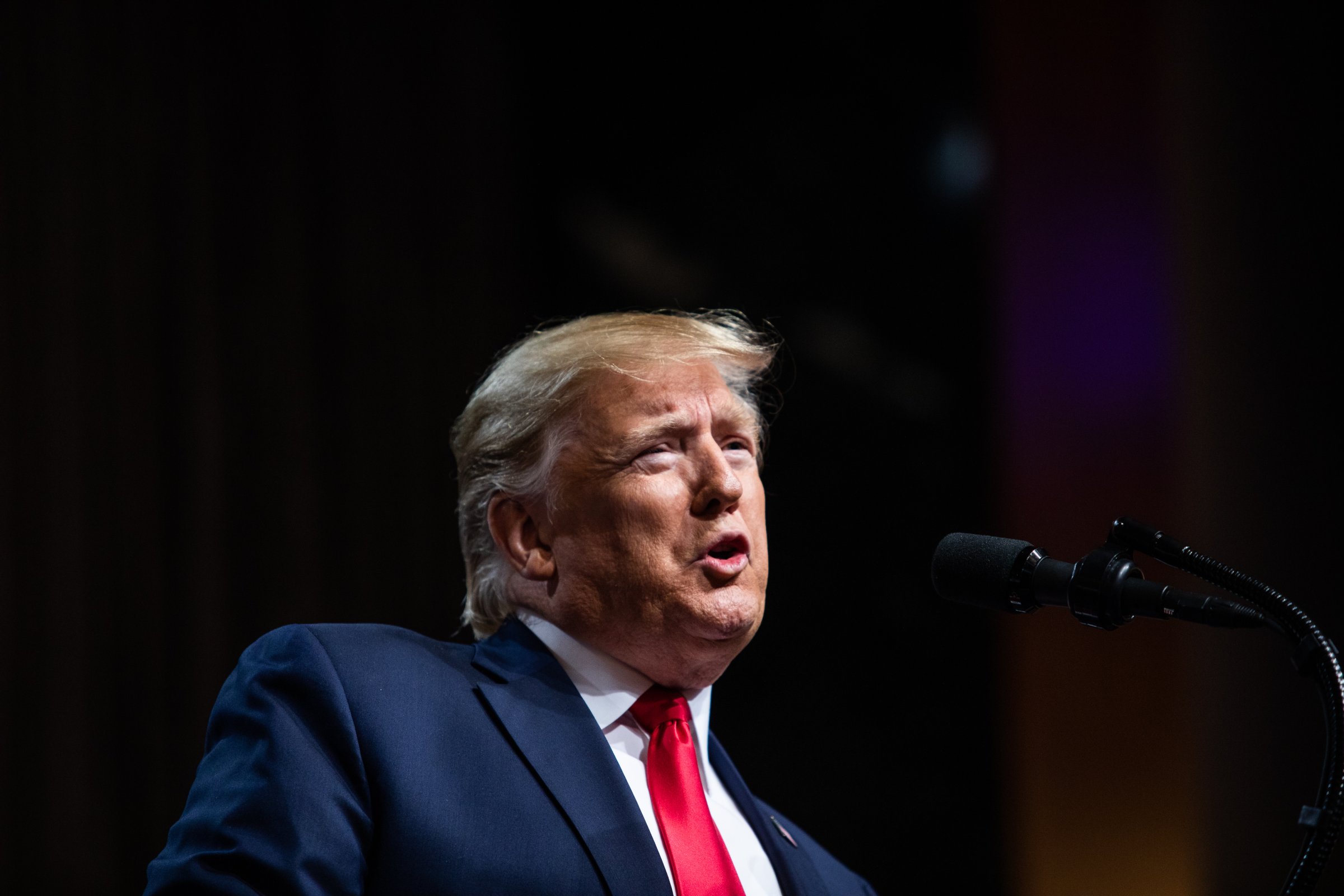
President Donald Trump on Friday advanced a Russian disinformation campaign aimed at the U.S. and its allies, endorsing a conspiracy theory less than 24 hours after his former top aide testified under oath that it was part of “a fictional narrative that has been perpetrated and propagated by the Russian security services.”
The conspiracy theory, which took root and later spread among far-right Internet websites, conservative media and members of Trump’s inner circle, holds that Ukraine conspired against Trump during the 2016 election and colluded with his rival, Hillary Clinton, by hiding the Democratic National Committee’s email server. The theory claims that CrowdStrike, a security firm hired to investigate the hacking of emails from the DNC, covered up Ukraine’s role and framed Russia instead. In the President’s July 25 call that helped trigger the impeachment inquiry, Trump asked Ukrainian President Volodymyr Zelensky to do him a “favor” and look into Crowdstrike.
The Ukraine theory has been dismissed as false by several of Trump’s current and former top advisors, including his former Homeland Security advisor and others, and by Russia policy experts who say circulating it benefits Moscow. Nevertheless, Trump once again made the false accusation Friday during a nearly hour-long call-in to the “Fox & Friends” morning show in an apparent attempt to defend himself against this week’s House Intelligence Committee impeachment hearings.
“They have the server from the DNC,” Trump told the three hosts.
“Who has the server?” asked co-host Brian Kilmeade.
“They gave the server to Crowdstrike or whatever it’s called, which is a company owned by a very wealthy Ukrainian,” Trump said. “And I still want to see that server. That’s a big part of this whole thing. Why did they give it to a Ukrainian company?”
“Are you sure they did that?” asked Steve Doocy, another co-host, shifting in his seat. “Are you sure they gave it to Ukraine?”
“Well, that’s what the word is,” Trump said. “That’s what I asked actually in my phone call, as you know.”
The theory has long been proven wrong — a point emphatically made just yesterday by Fiona Hill, Trump’s former top Russia adviser. The committee heard a similar statement Tuesday from Lt. Col. Alexander Vindman, Trump’s current top Ukraine expert.
Tom Bossert, Trump’s former Homeland Security adviser, told ABC News in September that the accusation was being pushed by Rudy Giuliani, Trump’s personal lawyer. “It’s not only a conspiracy theory, it is completely debunked,” he said. “At this point, I am deeply frustrated with what he and the legal team is doing in repeating that debunked theory to the President. It sticks in his mind when he hears it over and over again… It has no validity. The United States government reached its conclusion on attributing the DNC hack to Russia in 2016 before it even communicated it to the FBI, long before the FBI ever knocked on the door of the DNC.”
Trump has been repeating the Ukraine theory since at least April 2017 when he told the Associated Press he “heard it’s owned by a very rich Ukrainian.” He would continue to refer to the false narrative in other interviews that the firm was owned by Ukrainians or based there, despite the fact that it is a U.S. company based in Sunnyvale, Calif., with no known ties to Ukraine.
As the Mueller probe gained steam in the summer of 2017, Fox News host Sean Hannity devoted segments of his show to the allegations that the Clinton campaign had received help from Ukrainian officials, with a banner of the country’s blue-and-yellow flag reading in all-caps “UKRAINIAN ELECTION INTERFERENCE?” Trump’s son Donald Jr. amplified the Ukraine theories after his infamous Trump Tower meeting with a Kremlin-linked lawyer became public in July 2017, retweeting that “DNC operatives actively worked with Ukrainian government officials to dig up oppo research,” and asking, “No outrage???”
Hill told the Intelligence committee these false narratives threaten U.S. national security interests. “In the course of this investigation, I would ask that you please not promote politically driven falsehoods that so clearly advance Russian interests,” she testified, adding: “The fictions are harmful even if they are deployed for purely domestic political purposes.”
More Must-Reads from TIME
- Donald Trump Is TIME's 2024 Person of the Year
- TIME’s Top 10 Photos of 2024
- Why Gen Z Is Drinking Less
- The Best Movies About Cooking
- Why Is Anxiety Worse at Night?
- A Head-to-Toe Guide to Treating Dry Skin
- Why Street Cats Are Taking Over Urban Neighborhoods
- Column: Jimmy Carter’s Global Legacy Was Moral Clarity
Write to W.J. Hennigan at william.hennigan@time.com